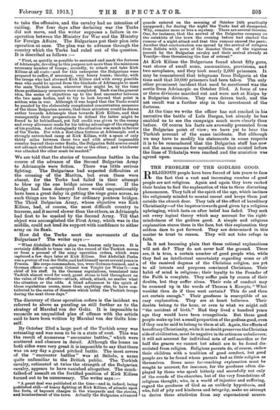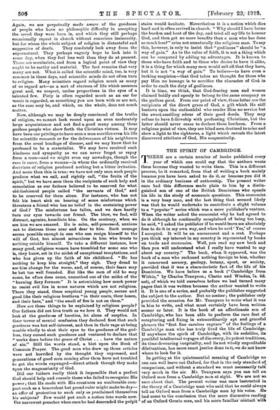THE PROBLEM OF THE GODLESS GOOD.
RELIGIOUS people have been forced of late years to face the fact that a vast and increasing number of good people are not religious. Again and again they have racked their brains to find the explanation of this to them disturbing phenomenon. They talk of the spirit of the age, which inclines the religiously minded to mental unrest and keeps them just outside the church door. They talk of the effect of hereditary Christianity—of the impetus towards good given by a religious upbringing, which lasts on after belief has faded. They seek out every logical theory which may account for tho right- mindedness of the godless good. A simple and religious explanation stares them in the face, but this explanation they seldom dare to put forward. They are determined in this matter to trust to reason. They will not take refuge in faith.
Is it not becoming plain that these rational explanations will not do P They do not cover half the ground. There are, it is true, a certain number of good people who, while they feel an intellectual uncertainty regarding some or all of the received dogmas of the Christian religion, are yet to all intents and purposes convinced Christians. Their habit of mind is religious ; their loyalty to the Founder of the Faith is complete. They suffer pain by reason of their doubts, but they suffer alone. Their rule of conduct may be summed up in the words of Thomas h Kempis, "What wouldst thou do if thou wert certain? This do and thou art certain enough." Their goodness is susceptible of an easy explanation. They are at heart believers. Their doubts belong to the hour, or even to what we might call "the accident of birth." Had they lived a hundred years ago they would have been evangelicals. But these good people make up but a small proportion of the godless good, even if they can be said to belong to them at all. Again, the effects of hereditary Christianity, while it no doubt preserves the Christian side of civilization, must be negative in its action on unbelievers; it will not account for individual acts of self-sacrifice or for
half the graces we cannot but admit are to be found dis- sociated from religion. Religious parents do, of course, endow their children with a tradition of good conduct, but good
people are to be found whose parents had as little religion as themselves. Some more far-reaching explanation must be
sought to account, for instance, for the goodness often dis- played by those who speak bitterly and scornfully not only of the creeds of the churches, but of the very foundations of religious thought; who, in a world of injustice and suffering, regard the goodness of God as an unlikely hypothesis, and who, full of pity and kindness and integrity, make no attempt to derive these attributes from any supernatural source. Again, we are perpetually made aware of the goodness of people who have no philosophic difficulty in accepting the creed they were born in, and which they still perhaps occasionally repeat in church without conscious insincerity. but for whom the whole subject of religion is distasteful and suggestive of death. They resolutely look away from the supernatural. They perhaps vaguely hope to look into it sonic day, when they feel less well than they do at present. These are secularists, and from a logical point of view they ought to be earthy and material. The fact remains that very many are not. What is called the scientific mind, too, is very common in these days, and scientific minds do not often turn to religion. Many scientists regard religion much as many of us regard art—as a sort of etcetera of life which assumes great and, we suspect, undue proportions in the eyes of a talented few. Piety is often regarded much as an ear for music is regarded, as something you are born with or are not, as the case may be, and which, on the whole, does not much matter.
Now, although we may be deeply convinced of the truths of religion, we cannot look round upon an even moderately large acquaintance and not find a good many among these godless people who show forth the Christian virtues. It may have been our privilege to have seen a man sacrifice even his life for scientific research or for the deliverance of his neighbours from the cruel bondage of disease, and we may know that he professed to be a materialist. We may have received such kindness and sympathy as we can never forget or repay from a man—and we might even say nowadays, though the ease is rarer, from a woman—in whom the ordinarily received doctrines of religion produced nothing but a bitter irritation. And more than this is true: we have not only seen such people produce what we call, and rightly call, " the fruits of the spirit," but we have seen them the recipients of such help and consolation as our fathers believed to be reserved for what old-fashioned people called "the servants of God," and to be reserved for them alone. For instance, who has not felt his heart sink on hearing of some misfortune which threatens a friend who has no belief in the sustaining power of God ? The misfortune has fallen, and we dare hardly turn our eyes towards our friend. The blow, we feel, will distract, agonize, humiliate him. On the contrary, when we see him we are amazed. He is calm, self-possessed, anxious not to distress those near and dear to him. Such courage seems possible enough in one who can resign himself to the will of God, but almost miraculous in him who trusts to nothing outside himself. To take a different instance, how many good, religious women have trembled for some one who is, they know, set in the midst of exceptional temptations, and who has given up the faith of his childhood. " He has nothing to keep him straight," they sigh. They dread to see Lim change for the worse, and, of course, their fears may be but too well founded. But like the men of old he may come, he often does come, unscathed out of the midst of the "burning fiery furnace." It is astonishing how much power to resist evil lies in some natures which are not religious. There they stand, these sceptical young people, secure and good like their religious brethren "in their coats, their hosen, and their bats," and " the smell of fire is not on them."
How are these things to be explained by religions people? Our fathers did not love truth as we love it. They would not look at the goodness of heretics, let alone of sceptics. In their terror of mental confusion they declared first that such goodness was but self-interest, and then in their rage at being unable wholly to shut their eyes to the goodness of the god- less, they cursed such goodness and ventured to declare that " works done before the grace of Christ . . . have the nature of sin." Still the words stand, a blot upon the Book of Common Prayer. The good men who drew up those articles were not horrified by the thought they expressed, and generations of good men coming after them have not troubled to get the words expunged—direct attack though they make upon the magnanimity of God. Did our fathers really think it impossible that a perfect God should help and console those who failed to recognize His power ; that He made with His creatures an unalterable com- pact such as a benevolent but proud ruler might make to-day- an offer of protection to such only as proclaimed themselves his subjects? Few would put such a notion into words now. the narrowest preacher when once he-had descended the pulpit stairs would hesitate. Nevertheless it is a notion which dies hard and is often revived in church. " Why should I have borne the burden and heat of the day, and tried all my life to honour God, and then get no more benefits than a man who has done so much less?" cries not unnaturally the religious man. To say this, however, is only to insist that "godliness" should be "a way of gain." As to the value of faith, it is not a thing which can be computed by adding up advantages. It is known to those who have faith and to those who desire to have it alike, it is a thing for which many men would sell all that they have, but it is not "a way of gain." To believe—to have even a lurking suspicion—that God takes no thought for those who pay Him no homage is to sacrifice the character of God in order to exalt the duty of godliness.
It is time, we think, that God-fearing men and women claimed boldly and openly to belong to the same company as the godless good. From our point of view, these latter are the recipients of the direct grace of God, a gift which He still bestows upon the unthankful who render Him no service but the sweet-smelling odour of their good deeds. They may refuse to have fellowship with professing Christians, but the latter should never cease to declare them brethren. From a religious point of view, they are blind men destined to arise and show a light to the righteous, a light which reveals the latest discovered attribute of God, His magnanimity.















































 Previous page
Previous page